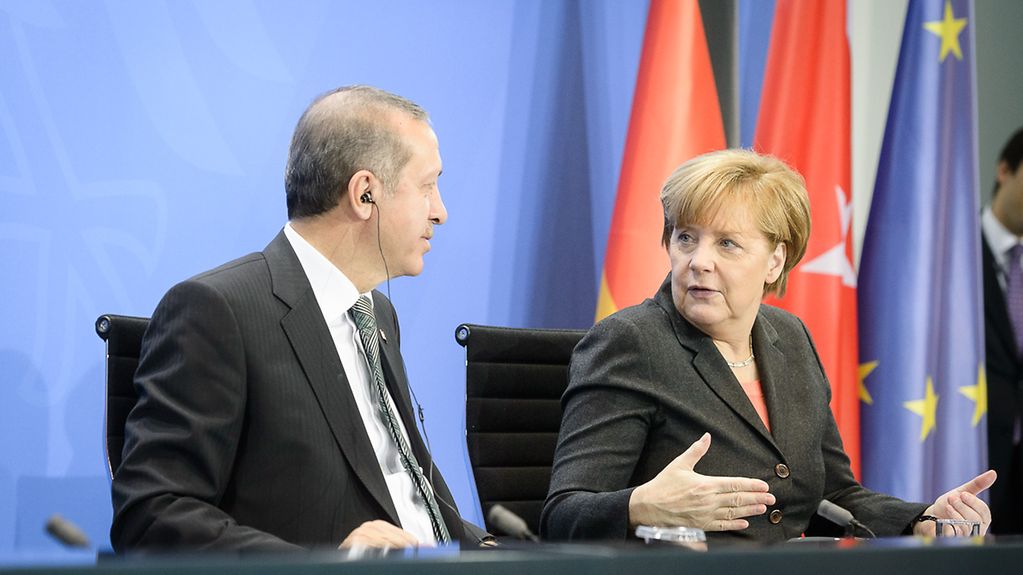Germany/Turkey
Germany and Turkey will be establishing closer business links, especially in the energy sector, declared Chancellor Angela Merkel after a meeting with Turkish Prime Minister Recep Tayyip Erdoğan in Berlin.
3 min reading time

People with Turkish roots can build bridges between the two nations
Photo: Bundesregierung/Steins
The new commission to step up business relations is to meet for the first time before the end of the year, reported Angela Merkel. Energy-policy cooperation too has been strengthened. "The new German government will continue with all these initiatives."
The Chancellor pointed in particular to the German-Turkish Year of Research, Education and Innovation 2014, which has just kicked off. And she expressed her delight that "the fist students began their courses at the Turkish-German University in Istanbul in late 2013".
Agreement on exchange regarding legal system
The talks at the Federal Chancellery were wide-ranging. With a view to the legal system, it was agreed that an exchange between the two ministries of justice will be put in place, reported Angela Merkel. It is to look, for instance, at issues of the independence of the judiciary, and the appointment of judges and public prosecutors.
The Chancellor continued, "We obviously hope that the reforms that have been undertaken in the last few years in Turkey will stand the test of time." This is to be reinforced in bilateral discussion.
No foregone conclusions in the accession negotiations with the European Union
With regard to Turkey’s accession negotiations with the European Union, the Chancellor declared that the results of the process are no foregone conclusion. Negotiations will now concentrate in depth on Chapter 22 – regional policy. It is thinkable that Chapters 23 and 24 "can be opened as soon as possible". They will deal with the rule of law, the judiciary and human rights.
After the conclusion of the European Council in December 2004, that, "Turkey sufficiently fulfils the Copenhagen political criteria" accession negotiations were opened on 3 October 2005. The negotiations focus on the acceptance of the body of EU law, known as the "acquis communautaire".
No need to choose one of two citizenships
An intensive dialogue is ongoing on how Turkish citizens living in Germany can exercise their right to vote in the coming presidential election in Turkey. Angela Merkel stressed that she sees herself as the Chancellor of all those living in Germany, not only of those who have been here longer.
Young people who have grown up in Germany, she continued, should not be forced into the difficult situation of having to choose between two citizenships. This is laid out in the coalition agreement. This is, she said, "an important step towards making these young people welcome in Germany".
A wide spectrum of close and intensive relations link Germany and Turkey. Not least the almost three million people with Turkish roots who live in Germany are a major factor in bilateral relations.
Anti-terrorism and the Syrian crisis
With a view to fighting terrorism, the ongoing dialogue between the two countries is to be further intensified.
The civil war in Syria too has played an important role in talks with the Turkish Prime Minister, said the Chancellor. "Turkey is making a massive contribution to accommodating Syrian refugees." Germany is to explore ways of supporting this. Developments in Syria are "untenable" said the Chancellor.
These talks have demonstrated once again, said the Chancellor, that Turkey and Germany share major strategic interests. People with Turkish roots living in Germany are a genuine bridge that brings together our two countries.
Economic relations
Germany is Turkey’s most important trading partner. The volume of bilateral trade in 2012 totalled 32.1 billion euros. From January to July 2013 the figure was 20.5 billion euros – 10 per cent up on the previous year. In November 2012 the two countries agreed in a "joint declaration" to step up bilateral cooperation in the energy sector.
The German-Turkish Energy Forum, which meets once a year, offers a new platform for dialogue between politicians and representatives of the business community of the two countries in the energy sector. In August 2013 the economics ministers of the two countries also agreed to set up a Joint Economic and Trade Commission (JETCO).